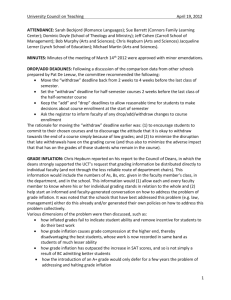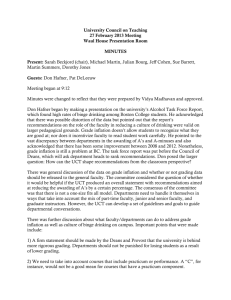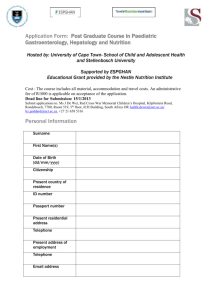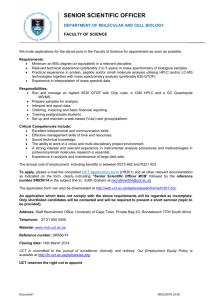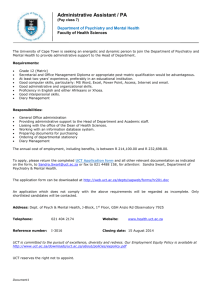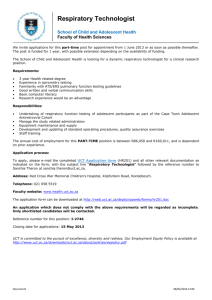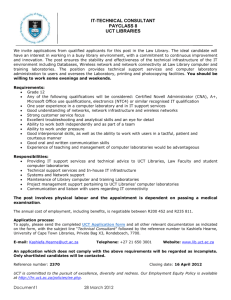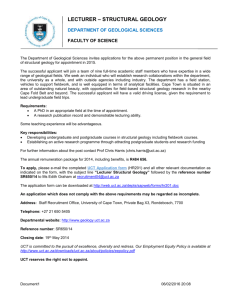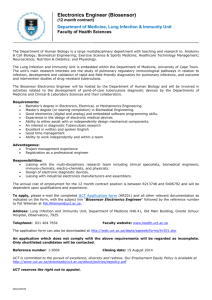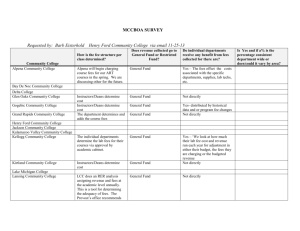March 20 - Boston College
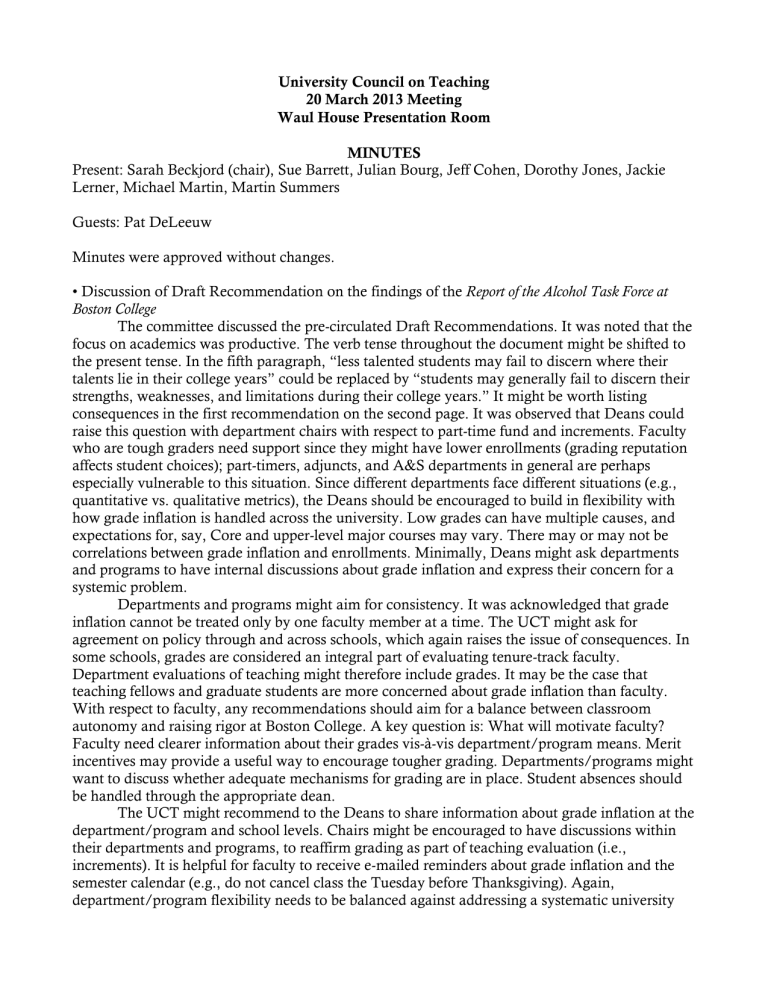
University Council on Teaching
20 March 2013 Meeting
Waul House Presentation Room
MINUTES
Present: Sarah Beckjord (chair), Sue Barrett, Julian Bourg, Jeff Cohen, Dorothy Jones, Jackie
Lerner, Michael Martin, Martin Summers
Guests: Pat DeLeeuw
Minutes were approved without changes.
• Discussion of Draft Recommendation on the findings of the Report of the Alcohol Task Force at
Boston College
The committee discussed the pre-circulated Draft Recommendations. It was noted that the focus on academics was productive. The verb tense throughout the document might be shifted to the present tense. In the fifth paragraph, “less talented students may fail to discern where their talents lie in their college years” could be replaced by “students may generally fail to discern their strengths, weaknesses, and limitations during their college years.” It might be worth listing consequences in the first recommendation on the second page. It was observed that Deans could raise this question with department chairs with respect to part-time fund and increments. Faculty who are tough graders need support since they might have lower enrollments (grading reputation affects student choices); part-timers, adjuncts, and A&S departments in general are perhaps especially vulnerable to this situation. Since different departments face different situations (e.g., quantitative vs. qualitative metrics), the Deans should be encouraged to build in flexibility with how grade inflation is handled across the university. Low grades can have multiple causes, and expectations for, say, Core and upper-level major courses may vary. There may or may not be correlations between grade inflation and enrollments. Minimally, Deans might ask departments and programs to have internal discussions about grade inflation and express their concern for a systemic problem.
Departments and programs might aim for consistency. It was acknowledged that grade inflation cannot be treated only by one faculty member at a time. The UCT might ask for agreement on policy through and across schools, which again raises the issue of consequences. In some schools, grades are considered an integral part of evaluating tenure-track faculty.
Department evaluations of teaching might therefore include grades. It may be the case that teaching fellows and graduate students are more concerned about grade inflation than faculty.
With respect to faculty, any recommendations should aim for a balance between classroom autonomy and raising rigor at Boston College. A key question is: What will motivate faculty?
Faculty need clearer information about their grades vis-à-vis department/program means. Merit incentives may provide a useful way to encourage tougher grading. Departments/programs might want to discuss whether adequate mechanisms for grading are in place. Student absences should be handled through the appropriate dean.
The UCT might recommend to the Deans to share information about grade inflation at the department/program and school levels. Chairs might be encouraged to have discussions within their departments and programs, to reaffirm grading as part of teaching evaluation (i.e., increments). It is helpful for faculty to receive e-mailed reminders about grade inflation and the semester calendar (e.g., do not cancel class the Tuesday before Thanksgiving). Again, department/program flexibility needs to be balanced against addressing a systematic university
problem. Recommendations #2 and #4 might be combined since they deal with specific issues of syllabi and pedagogy. Use of the word “should” throughout should be changed (#6 to read: The committee encourages ….). With respect to the specific possible correlation between grade inflation and drinking at B.C., the UCT might encourage specific attention to attendance and assignments around big games, known drinking days, and holidays. We would like the chair to present our recommendations to the Provost’s Advisory Council and the Council of Deans. It is a healthy sign that B.C. can discuss openly the issue of excessive student drinking; we are a successful institution that can acknowledge the problems we do have in order to confront them directly.
• Update on TAMs, Joint UCT/ATAB Academic Innovation Project, and Center for Teaching
Excellence.
There have been many TAM grant requests. Some proposals might be appropriate for the
Joint UCT/ATAB projects. The subcommittee should aim for distributing the grants broadly.
Decisions will need to be made by the middle of April. Some promising proposals that are not selected might be encouraged to reapply next year. Mary Crane, who is co-directing the Core
Renewal Project, would like to meet with chairs of the UCT and ATAB regarding academic technology and the Core.
With respect to the Center for Teaching Excellence, we are still waiting for space issues to be resolved. IT and the Library are in conversation about their big picture needs and vision. The
Center will address long-standing needs for interdisciplinary collaboration that are also currently be addressed as part of the Core renewal. Further interdisciplinary initiatives might include institutional forums that bring people together, funding, team-teaching course loads, etc.
• Discussion of policy on consensual relationships.
A policy on teacher/student consensual relationships is needed at B.C. The lack of such a policy gives impression that such relationships are acceptable. Existing harassment protocols are not adequate to address the issue of consensual relationships (harassment requires a complaint, graduate students are at B.C. temporarily, etc.). The lack of a policy inhibits intervention by other faculty members; with such a policy in place, if someone is aware of a consensual teacher/student relationship and does not report it, that third party is remiss.
Model policies on teacher/student consensual relationships exist at other universities.
They range from affecting all employees and junior/senior relationships to only faculty/students relationships. If the relationship between student and teacher is central to the university’s academic mission, you don’t want abuse. At B.C. the proper place for such a policy would be the faculty handbook and might cover any evaluative relationship involving any teacher and any student. Staff issues are referred to human resources. The question was raised whether there should be consequential or due process mechanisms. Such a policy might address professional conduct, ethics, the appearance of impropriety, the obligation to disclose, the need to protect all constituents, and consequence of not disclosing. Teachers in positions of power and authority should recuse themselves from such positions if they are involved in a consensual relationship with a subordinate. One’s chair should promptly be notified if such a relationship begins. At some schools, the chair reports the situation to the Dean. The purpose of such a policy is not to overrule matters of the heart but rather to protect students at all levels from potentially exploitative dynamics.
We need such a policy at B.C. Drawing on existing policies elsewhere, the UCT should write a policy and submit it to the Provost’s Advisory Council and Council of Deans. Columbia’s policy is short and clear, and Penn’s has the right spirit.
We will have a meeting in May.
Minutes prepared by Julian Bourg.
